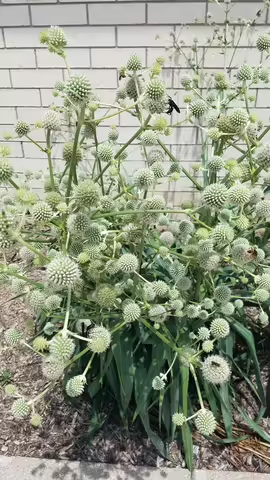When a plant has “rattlesnake” in its name, there has to be a story behind it. There are at least three plants native to Illinois that do: Rattlesnake Plantain (Goodyera pubescens), Rattlesnake Root, also known as Rough White Lettuce (Prenanthes aspera), and Rattlesnake Master (Eryngium yuccifolium). Rattlesnake Master is planted in several public gardens in the Springfield area. Gardens include U of I Extension Prairie to Perennial garden, Native Wildflower garden at Lincoln Memorial Garden, and the Dana-Thomas House in both the Cottage Butterfly Garden and the Courtyard.
Rattlesnake Master grows best in full sun with slightly moist to dry conditions. The bluish-green leaves of the plant are up to 2 feet long, with pointed tips and small teeth along the margins, resembling those of yucca, hence the Latin name. These tough, fibrous leaves were woven into shoes by Native Americans. The Mesquakies used the leaves and flowers in their rattlesnake medicine song and dance. The roots were used for a variety of ailments.
Rattlesnake master can grow to 2 to 5 feet tall and is found in prairies and open woods throughout the state, blooming in July and August. The flowers are tightly packed into thistle-like round heads. Whitish bracts stick out from the flower heads, giving a prickly appearance and feel. The greenish-white thistle like nectar producing flowers are attractive to many types of insects including bees, butterflies, beetles and moths. Blooms appear in mid-summer and the seedheads remain attractive for several months. The plant is from the carrot/parsley family, so Eastern Black Swallowtail butterflies may lay their eggs on the leaves.
For more information visit Illinois Wildflowers website
Article written by Susan Shaw, University of Illinois Extension master naturalist volunteer.
Sources:
Illinois Wildflower by Don Kurz, copyright 2004 and 2014 by Tim Ernst Publishing
Prairie Plants of Illinois by John W. Voight and Robert H. Mohlenbrock, printed by the State of Illinois Department of Conservation
The Tallgrass Prairie Center Guide to Seed and Seedling Identification by Dave Williams copyright 2010 by the Tallgrass Prairie Center
